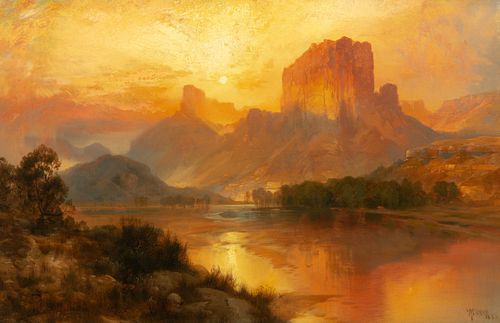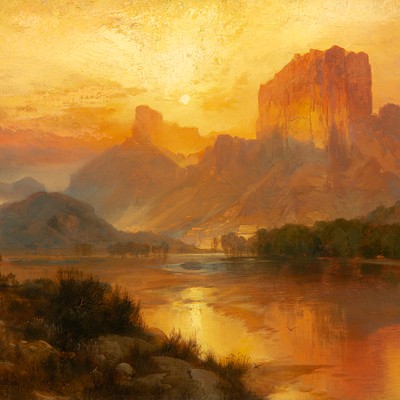Thomas Moran (1837-1926); Green River, Wyoming (1883)
Lot 111
About Seller
Coeur d'Alene Art Auction
11944 North Tracey Road
Hayden, ID 83835
United States
Coeur d’Alene Art Auction specializes in the finest classical Western and American Art representing past masters and outstanding contemporary artists. The auction principals have over 100 years of combined experience in selling fine art and have netted their clients over $325 million in the last fif...Read more
Categories
Estimate:
$1,000,000 - $1,500,000
Absentee vs Live bid
Two ways to bid:
- Leave a max absentee bid and the platform will bid on your behalf up to your maximum bid during the live auction.
- Bid live during the auction and your bids will be submitted real-time to the auctioneer.
Bid Increments
| Price | Bid Increment |
|---|---|
| $0 | $250 |
| $5,000 | $500 |
| $10,000 | $1,000 |
| $20,000 | $2,500 |
| $50,000 | $5,000 |
| $100,000 | $10,000 |
| $200,000 | $25,000 |
| $500,000 | $50,000 |
| $1,000,000 | $100,000 |
About Auction
By Coeur d'Alene Art Auction
Jul 25, 2020
Set Reminder
2020-07-25 15:00:00
2020-07-25 15:00:00
America/New_York
Bidsquare
Bidsquare : Fine Western & American Art
https://www.bidsquare.com/auctions/coeur-dalene/fine-western-american-art-5263
The 2020 Coeur d'Alene Art Auction to be held July 25 in Reno, Nevada, will feature 264 selections of unparalleled quality in Western paintings and sculpture from historical and contemporary artists such as Charles M. Russell, Henry Farny, Thomas Moran, Edward S. Curtis, Carl Rungius, and more. Coeur d'Alene Art Auction info@cdaartauction.com
The 2020 Coeur d'Alene Art Auction to be held July 25 in Reno, Nevada, will feature 264 selections of unparalleled quality in Western paintings and sculpture from historical and contemporary artists such as Charles M. Russell, Henry Farny, Thomas Moran, Edward S. Curtis, Carl Rungius, and more. Coeur d'Alene Art Auction info@cdaartauction.com
- Lot Description
Thomas Moran (1837-1926)
Green River, Wyoming (1883)
oil on canvas
13.25 x 20 inches
signed and dated lower right
VERSO
Label, Newhouse Gallery, New York, NY
Label, Gerald Peters Gallery, New York, NY
Describing this painting, Phyllis Braff, co-editor of the Thomas Moran Catalogue Raisonné wrote, “As the setting for the first sketch made during his 1871 inaugural journey to experience the characteristics of the storied American West, the Green River site long held a special resonance for Thomas Moran. He re-engaged with his impressions during an 1879 visit, which could be regarded as direct reinforcement for planning this painting, Green River, Wyoming. A number of the artist’s sketches of the dominant butte date from this second visit. Most are now in the Gilcrease Collection, Tulsa, but individual sheets are also in the Jefferson National Expansion Memorial, St. Louis and the Thomas Moran Collection at the East Hampton Library, Long Island.
“The locale’s visual power contributed to the artist’s decision to undertake a number of Green River interpretations over the years. While each differs in tonality, mood, and compositional details, the orientation depicted here is one that is often considered to be outstanding because of its strong impact. The tall, steep-sided, towering rock butte serves as a dynamic focal point while at the same time emphasizing the forces of geology and the drama of the red crown.
“In the early 1880s, when Green River, Wyoming was executed, Moran was just entering the most painterly creative phase of his career, traveling less and concentrating on the studio work that permitted him to explore expanded possibilities for pigment and brushwork. This led to particularly stunning golden atmospheric effects in Green River, Wyoming, where layers of soft paint strokes in warm, sun-drenched yellow, orange and red-orange tones build and define both the distant sky and the foreground river. By merging the optical sensation of far away stone peaks with nearby ephemeral reflections through color and technique, Moran unifies the entire surface. It is a pleasing effect and an achievement considered quite modern.”Surface condition is very good. Painting has been lined. Faint cracking in center of painting, and in upper-left corner. Several thin lines of inpainting corresponding with cracks in upper-left corner. Several specks of inpainting in upper-right quadrant, and in center-left portion of painting.Condition
- Buyer's Premium



 EUR
EUR CAD
CAD AUD
AUD GBP
GBP MXN
MXN HKD
HKD CNY
CNY MYR
MYR SEK
SEK SGD
SGD CHF
CHF THB
THB












